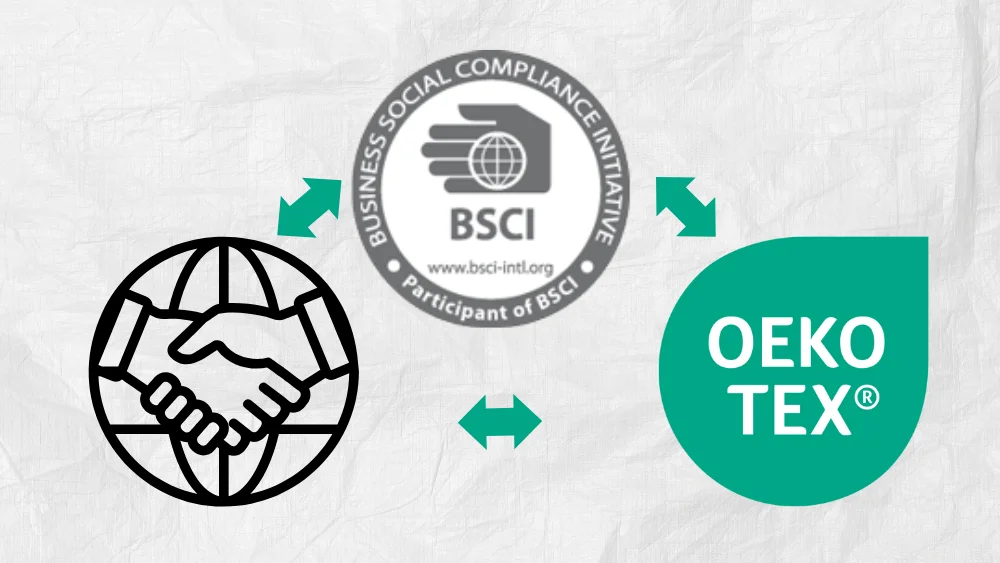Choosing a sustainable lingerie manufacturer is essential for both brands and consumers. By selecting ethically responsible manufacturers, brands enhance consumer trust and align with growing environmental and social responsibility trends. Consumers who choose sustainable lingerie not only support high-quality products but also contribute to a more sustainable, ethical fashion industry.
Table of Contents
Why Choosing a Sustainable Lingerie Manufacturer is Crucial
Consumer Ethical Awakening
With the growing awareness of environmental and social responsibility, more and more consumers are focusing on the sustainability and ethical practices of the brands they support. The fashion industry, especially in the lingerie sector, has long faced significant environmental and social responsibility issues. From water waste to unfair labor conditions, these concerns have prompted consumers to reconsider their purchasing decisions. Today, many consumers are not only concerned with the appearance and price of products but also with whether the brand genuinely cares about the planet and its workers. The environmental and ethical performance of a brand has become a key factor in consumers’ choices. More people now want to support more responsible companies by purchasing sustainable products. When you choose a sustainable lingerie manufacturer, you are directly contributing to a better future for the environment and society.
Industry Change Driver
The lingerie industry, as a key part of the fashion sector, is undergoing a shift from traditional production models to more sustainable and ethical practices. As environmental pollution, resource waste, and workers’ rights issues continue to surface, traditional production methods have come under increasing criticism. In this context, sustainable lingerie brands have emerged, committed to using eco-friendly materials, improving production processes, ensuring fair labor conditions, and enhancing consumer trust through transparent supply chain management. This transformation is not only a response to consumer demand but also a necessary step towards a greener and more responsible future for the fashion industry.
Sustainable Lingerie Manufacturer vs. Traditional Lingerie Manufacturer

Environmental Impact Comparison
- Environmental Cost of Traditional Lingerie
Traditional lingerie production often relies on synthetic materials like polyester and nylon, which are derived from petrochemicals. This production process consumes a large amount of energy and generates significant carbon emissions. The chemical dyes and treatments used in traditional lingerie production can create harmful waste, which, if not properly disposed of, can contaminate water sources and soil. Many traditional lingerie manufacturers also rely on non-renewable resources, and their production processes consume significant amounts of water. Synthetic fibers, such as polyester, degrade slowly, leading to long-term waste in landfills and further environmental burdens. - Environmental Advantages of Sustainable Lingerie
In contrast to synthetic fibers in traditional lingerie, sustainable lingerie brands use more natural and renewable materials, such as organic cotton, bamboo fiber, hemp, and recycled polyester. These materials reduce water and energy consumption during production and avoid the use of harmful chemicals. Organic cotton farming does not use chemical pesticides or fertilizers, reducing environmental pollution. Bamboo fiber is made from bamboo, which grows quickly, uses little water, and is naturally antibacterial, helping to keep lingerie fresh. Hemp is another low-resource natural fiber that grows without the use of pesticides or fertilizers, minimizing its impact on soil and water. Additionally, recycled polyester, made from waste plastic bottles or old clothing, reduces plastic waste and saves significant energy and water compared to producing virgin polyester. By recycling, sustainable lingerie manufacturers reduce reliance on natural resources and significantly minimize waste.
Health Benefits
- Health Risks of Traditional Lingerie
Synthetic fibers used in traditional lingerie, such as polyester and nylon, may contain irritating chemicals that can affect the skin. Even with daily wear, these materials can release chemicals that lead to allergic reactions or other health issues. Additionally, chemical dyes commonly used in traditional lingerie may contain harmful substances, which, when worn over long periods, can cause skin irritation or allergic reactions, especially for sensitive skin types. Traditional lingerie also tends to have poor breathability, especially when made of synthetic fibers, leading to skin suffocation, sweating, and bacterial growth, potentially causing various skin issues like allergies, eczema, and fungal infections. - Benefits of Sustainable Lingerie
Sustainable lingerie brands use natural, non-toxic materials such as organic cotton, bamboo fiber, and hemp. These materials are not only soft and comfortable but also naturally reduce the skin’s exposure to chemicals, lowering the risk of allergic reactions. Organic cotton is grown without chemical pesticides, preventing skin contact with harmful chemicals. Bamboo fiber is naturally antibacterial, moisture-wicking, and breathable, making it ideal for direct skin contact, keeping the skin dry and healthy. Hemp fibers are not only breathable but also help regulate temperature and humidity, reducing skin problems caused by sweat accumulation. More importantly, lingerie made from these natural materials offers significant comfort and health benefits, making it ideal for long wear, especially for those with sensitive skin.
Durability and Quality
- Short-Term Durability of Traditional Lingerie
Because traditional lingerie is often produced with a focus on cost reduction, many brands use low-cost synthetic fibers. Compared to natural fibers, these materials are typically more prone to wear and tear, and their durability is lower. Synthetic fiber lingerie can quickly fade, shrink, or lose shape after frequent wear and washing, leading consumers to replace their lingerie more often. This lower durability not only increases personal consumption costs but also exacerbates resource waste. Each piece of lingerie discarded due to quality issues results in more waste entering the environment. - Long-Term Value of Sustainable Lingerie
Sustainable lingerie brands emphasize the durability and quality of their products. They typically use high-quality natural fibers or well-designed recycled materials, ensuring that the lingerie can withstand more wear and washing. By investing in durable and long-lasting products, consumers not only reduce the environmental burden but also save on purchasing frequency in the long run, reducing their consumption costs. For example, lingerie made from organic cotton, bamboo fiber, and other sustainable materials usually excels in both comfort and durability, providing longer-lasting use and effectively reducing resource waste from frequent replacements.
| Feature | Traditional Lingerie | Sustainable Lingerie |
|---|---|---|
| Materials | Synthetic fibers (polyester, nylon), chemical dyes | Organic cotton, bamboo fiber, hemp, recycled polyester |
| Environmental Impact | High carbon emissions, high water consumption, non-renewable resources, slow degradation | Reduces carbon footprint, saves water, uses renewable materials, supports a circular economy |
| Chemical Use in Production | High use of chemical dyes and treatments, waste may pollute the environment | Natural dyes and non-toxic materials, reduces harmful chemicals |
| Skin Impact | May contain allergens or harmful chemicals, poor breathability, prone to skin issues | Natural materials, breathable, reduces allergies, eczema, and other skin problems |
| Durability | Prone to wear and tear, shorter lifespan, frequent replacements | Emphasizes durability and high quality, longer lifespan, reduces replacement frequency |
| Resource Waste | High frequency of replacements leads to resource waste, increased environmental burden | Increases durability, reduces resource waste, saves money and environmental resources |
Key Characteristics to Look for When Choosing a Sustainable Lingerie Manufacturer

When selecting the right lingerie manufacturer, especially one that is focused on sustainability and ethical production, it is crucial to ensure that the manufacturer meets certain key standards. Here are some critical features to look for when choosing a sustainable lingerie manufacturer.
Use of Sustainable Materials
Sustainability is one of the most crucial factors when choosing a sustainable lingerie manufacturer. With growing global awareness of environmental issues, more and more consumers are demanding that brands use eco-friendly materials, shifting the focus from just price and style. Choosing a manufacturer that uses sustainable materials not only reduces environmental impact but also enhances the brand’s sustainability image.
- Organic Cotton: Compared to conventional cotton farming, organic cotton cultivation avoids the use of chemical pesticides and fertilizers, which reduces pollution of the soil, water, and biodiversity. More importantly, organic cotton production helps protect the health of agricultural land and significantly reduces carbon emissions. For consumers, wearing organic cotton lingerie not only avoids contact with harmful chemicals but also supports more environmentally-friendly farming methods.
- Recycled Fibers: Recycled materials like recycled polyester and recycled nylon, made from waste plastic bottles, old clothing, or other plastic waste, can effectively reduce plastic waste and lower the need for new resources. The production of recycled fibers generally consumes less energy and water than virgin materials, thus putting less strain on the environment.
- Tencel (Lyocell) and Other Biodegradable Fibers: Tencel is a fiber made from wood pulp, produced using a closed-loop process where nearly all chemicals and water are recycled, reducing pollution and resource waste. The production of Tencel is more eco-friendly than that of traditional fibers, and its biodegradable properties make it an ideal choice for lingerie manufacturing.
Choosing a manufacturer that uses these materials ensures the environmental sustainability of the product and boosts the brand’s competitive edge in sustainability. Today’s consumers are increasingly aware of the material sources behind the products they purchase, so choosing a manufacturer with transparent and eco-friendly standards is a long-term investment for any brand.
Fair Labor Practices
A manufacturer’s labor practices directly affect the ethical image and social responsibility of its brand. A sustainable lingerie manufacturer should commit to fair labor practices, which is especially important when selecting a partner. As globalization continues, many fashion brands have moved their production lines to regions with lower labor costs, which has led to an increase in labor rights issues. Therefore, ensuring that manufacturers provide safe working conditions, fair wages, and good welfare benefits for workers is an essential standard when choosing a sustainable lingerie manufacturer.
- Safe Working Environment: Workers should operate in safe, hygienic conditions where production equipment and processes meet national and international safety standards. Furthermore, manufacturers need to provide regular occupational health checks for workers to reduce the incidence of work-related diseases.
- Fair Wages and Benefits: Manufacturers should ensure that workers receive fair wages, not just meeting the minimum wage standard but paying reasonable salaries based on skills and work experience. Additionally, manufacturers should provide basic social security and welfare benefits such as healthcare, worker’s compensation, and paid vacation to ensure workers’ well-being.
- Opposition to Forced Labor and Child Labor: Ethical manufacturers must strictly adhere to international labor standards, such as those established by the International Labour Organization (ILO), which prohibit forced labor and child labor. Choosing such manufacturers helps brands eliminate unethical labor practices in their global supply chains and avoid damage to their brand reputation.
Choosing a manufacturer that complies with fair labor practices reflects a brand’s commitment to social responsibility and is at the core of its values. By establishing a fair supply chain, brands ensure that every stage of production does not involve exploitation or injustice.
Supply Chain Transparency
With rising consumer demands for brand transparency, supply chain transparency is another key factor to consider when choosing a sustainable lingerie manufacturer. A transparent supply chain allows consumers to gain a clearer understanding of where the products come from, how they are made, and the conditions under which workers operate, enabling them to make more informed purchasing decisions. Brands that lack transparency in their supply chain often struggle to gain the trust of modern consumers, particularly those who are more concerned with environmental and social responsibility.
- Transparency in the Production Process: Manufacturers should disclose their production processes, from raw material sourcing to manufacturing, dyeing, and packaging, detailing every step of the process. Every part of the supply chain should be traceable to ensure that no harmful materials or improper production methods are used.
- Transparency in Material Sourcing: Consumers are increasingly concerned with where materials come from, so choosing a brand that can clearly disclose the source and production process of its materials will undoubtedly increase the brand’s credibility. Ethical manufacturers should openly share whether the materials used meet sustainability standards and provide information about the source and treatment of these materials.
- Certifications and Third-Party Audits: Certification bodies can help increase supply chain transparency, ensuring that production adheres to international standards. Many ethical lingerie brands choose to join certification systems such as Fair Trade, BSCI (Business Social Compliance Initiative), and OEKO-TEX, which provide consumers with more credible guarantees of the brand’s sustainability and ethical practices.
Modern consumers want to make informed choices when purchasing products, and a transparent supply chain is the foundation that ensures consumers receive accurate information. A manufacturer that provides clear and transparent supply chain information will enhance consumer trust in the brand and increase brand loyalty.
Certifications and Compliance
When selecting a lingerie manufacturer, ensuring that they hold relevant certifications is a crucial step in evaluating their sustainability and ethical commitment. Certifications not only demonstrate the manufacturer’s efforts in environmental and ethical practices, but they also provide reliable legal protection and market credibility for the brand. Here are some certification-related questions to ask:
1.Do you hold international certifications, such as ISO 14001, BSCI, OEKO-TEX, etc.?
ISO 14001 certification shows that the manufacturer has established an effective environmental management system to reduce the negative impact of production on the environment.
BSCI (Business Social Compliance Initiative) certification proves that the manufacturer adheres to international labor laws and is committed to improving working conditions within the supply chain.
OEKO-TEX certification indicates that the fabrics and dyes used by the manufacturer meet safety and environmental standards, particularly suitable for textiles and lingerie products.
Fair Trade certification is another important mark, ensuring that the manufacturer adheres to fair trade principles and that every step of the production process complies with social responsibility standards.
2.Do you provide transparent compliance or social responsibility reports?
Ask the manufacturer whether they provide regular compliance reports detailing their adherence to environmental, social responsibility, and labor regulations during production. These reports can help brands understand the manufacturer’s compliance in various areas.
3.How do you handle regulatory changes to ensure long-term compliance?
As environmental and labor laws continue to evolve, it is essential to ensure that the manufacturer can adapt and maintain long-term compliance. Ask the manufacturer how they handle regulatory changes to ensure their production processes meet the latest requirements across different countries and regions.
Manufacturers with these international certifications typically offer higher levels of transparency and sustainability, which not only increases consumer trust but also helps brands avoid the legal risks associated with compliance issues.
Key Questions to Ask Sustainable Lingerie Manufacturer
When choosing a lingerie manufacturer that meets sustainability and ethical standards, asking the right questions is crucial. This not only helps ensure the manufacturer aligns with the brand’s values, but it also provides insight into the production process, ensuring the product meets high standards of quality and social responsibility. Here are several key questions to ask potential manufacturers.
Material Sourcing Questions
First and foremost, ensuring that the manufacturer uses sustainable, non-toxic materials should be a priority for any brand. The sourcing of materials directly impacts the product’s environmental footprint, health benefits, and overall sustainability. Here are some key questions:
- What materials do you use? Are these materials certified?
Understanding the types of materials a manufacturer uses is crucial, especially whether they use sustainable materials like organic cotton, recycled polyester, bamboo fiber, or hemp. Ensure these materials meet international environmental standards and are free from harmful chemicals. - Is the source of your materials transparent? Can you provide relevant certificates or supply chain information?
Modern consumers are increasingly concerned with the origins and production processes of the products they buy. Brands should ask manufacturers to provide detailed information about the sourcing of materials, particularly ensuring that every step of the supply chain is traceable and transparent. - Do you use non-toxic dyes and chemicals?
Ensure the manufacturer uses natural, non-toxic dyes to avoid using harmful chemicals that could be harmful to consumers’ health. Certain dyes may contain heavy metals or other harmful substances that could pose potential health risks to the skin.
These questions help brands ensure the environmental sustainability of their products and increase their appeal to consumers who care about health and environmental impact.
Labor Practices and Safety Conditions
When selecting a manufacturer, ensuring that workers receive fair treatment and work in safe conditions is critical. Many brands may overlook labor rights in the rush to increase production, which not only impacts the brand’s reputation but could also lead to legal risks. Therefore, brands should proactively ask the following questions:
- How do you ensure workers receive fair wages?
Ask manufacturers how they ensure workers are paid fair wages, whether they adhere to minimum wage laws, and if they pay reasonable salaries based on workers’ job types and skills. - Does your workplace meet international safety standards?
Understand whether the manufacturer’s workplace meets international safety standards, such as whether workers are provided with necessary personal protective equipment, and if regular health checks are conducted. - Do you have training programs for workers to improve their skills and safety awareness?
Offering safety training and skills development programs is crucial for improving workers’ conditions and efficiency. Ask the manufacturer if they provide such programs, ensuring workers’ long-term professional development. - Do you have emergency procedures and workers’ compensation insurance?
Ensure the manufacturer provides workers with appropriate insurance and has emergency procedures in place in case of accidents, ensuring workers are protected.
By asking these questions, brands can ensure that their partners follow ethical labor standards, providing fair treatment and safe working conditions for workers, and avoiding potential labor scandals and negative publicity.
Why Choose a Manufacturer with Ethical Commitments

Choosing a manufacturer with ethical and sustainable production commitments is crucial for the brand’s social responsibility and environmental impact, as well as for building stronger consumer trust and long-term brand competitiveness. Here are several key reasons why choosing an ethical manufacturer is essential for a brand.
Enhancing Brand Trust
In today’s market, consumers are increasingly focused on a brand’s ethics and sustainability. When a brand chooses a sustainable lingerie manufacturer that adheres to ethical standards, it signifies that the brand is putting its commitment to environmental protection, social responsibility, and fair labor into practice. As a result, consumer trust in the brand is naturally strengthened. This trust is especially important as more and more consumers prioritize the social and environmental responsibility behind a brand.
- Transparency and Trust: When you choose a sustainable lingerie manufacturer, it means that every step of the production process is open to the consumer. The brand can demonstrate that its products not only meet high-quality standards but also follow strict environmental and social responsibility requirements. This transparency boosts consumer confidence in purchasing.
- Brand Loyalty: Over time, consumers are more likely to support brands that have a strong sense of responsibility, especially when a product and brand philosophy align with their personal values. Sustainable and ethical manufacturers help brands establish a deeper connection with consumers, and this loyalty will drive long-term brand growth.
Enhancing Brand Competitiveness
As environmental awareness and social responsibility become more widespread, consumers no longer choose products based solely on price and style. They are more focused on whether a brand’s values align with their lifestyle. By choosing a responsible manufacturer, a brand can not only increase its market recognition but also stand out in an increasingly competitive market.
- Attracting Eco-Conscious Consumers: Today, environmental responsibility and social ethics have become key factors in consumer decision-making. By partnering with an ethical manufacturer, a brand can better cater to eco-conscious consumers. For example, more young consumers are willing to pay a premium for brands that focus on environmental and social responsibility, providing brands with opportunities for differentiated competition.
- Innovation and Sustainability: Choosing an ethical manufacturer means that a brand is not only keeping up with market changes but also setting an industry benchmark through innovative designs and sustainable production methods. As sustainability becomes one of the core directions for future development, collaborating with ethical manufacturers for continuous innovation will not only improve market recognition but also enhance the brand’s long-term competitiveness.
Solving Key Procurement Pain Points
In a brand’s procurement process, choosing a reliable ethical manufacturer can enhance the brand’s social responsibility image and effectively address some common procurement challenges, ensuring smooth and efficient production processes. Here’s how an ethical manufacturer can help resolve key issues faced in procurement.
Mitigating Supply Chain Issues
Brands often face instability in their supply chains, such as production delays and inconsistent quality. These issues may lead to delayed delivery times and substandard quality, which can damage the brand’s reputation and customer satisfaction. Choosing a sustainable lingerie manufacturer can effectively solve these issues by providing a stable supply chain management system.
- Stable Supply Chain: When you choose a sustainable lingerie manufacturer, it means that the manufacturer adheres to high standards in production management, raw material sourcing, and worker management. Ethical manufacturers usually have robust supply chain management systems in place, ensuring production schedules and delivery dates remain stable. By reducing delays and quality fluctuations, brands can maintain a reliable supply chain and ensure timely deliveries.
- Quality Control: Ethical manufacturers not only focus on environmental protection and social responsibility but also prioritize product quality. They typically have strict quality control systems to ensure that every step of production, from raw material sourcing to the final product, meets quality standards. By working with these manufacturers, brands can ensure product consistency and reduce complaints and returns related to quality issues.
Adhering to Legal and Regulatory Compliance
As brands operate globally, they must comply with various local and international laws and regulations. In particular, with tightening regulations around environmental protection and labor laws, brands need to ensure that every link in their supply chain complies with local and international requirements. Non-compliance can result in legal actions and reputational damage. Choosing a sustainable lingerie manufacturer that adheres to these standards can help a brand mitigate legal risks.
Avoiding Legal Risks: Manufacturers that adhere to ethical standards typically ensure compliance with the latest regulations. For example, manufacturers certified with ISO, BSCI, and OEKO-TEX can ensure that their products and production processes meet international environmental and social responsibility standards. This helps brands avoid legal risks due to non-compliance when they choose a sustainable lingerie manufacturer.
Adapting to International Regulatory Changes: As global environmental and social responsibility regulations become stricter, ethical manufacturers are more capable of adapting to these changes and ensuring compliance. They are equipped to handle changes in international regulations, ensuring that brands stay compliant and legally secure in various markets.
Adapting to Market Trends
Market trends are constantly evolving, especially in terms of environmental and ethical requirements. Consumer interests and demands are shifting, with more people willing to pay higher prices for products that meet ethical and environmental standards. By choosing a sustainable lingerie manufacturer, brands can better adapt to these changes and maintain competitiveness in the market.
Keeping Up with Environmental Trends: Choosing a sustainable lingerie manufacturer helps brands stay aligned with global environmental trends. For example, as green consumerism rises, more consumers demand that brands use eco-friendly materials, reduce waste, and lower carbon footprints. By collaborating with ethical manufacturers, brands can continuously innovate and enhance the environmental and social responsibility of their products, thereby improving their market positioning.
Enhancing Brand Image: By partnering with a manufacturer that meets ethical and sustainable standards, brands not only respond to consumer demands for environmental and social responsibility but also establish a positive brand image. This image helps increase brand recognition and loyalty, thereby enhancing the brand’s market position.
Making the Right Choice for Brands and Consumers
In today’s society, consumers’ expectations from brands go beyond just quality and price. With growing awareness of environmental issues and social responsibility, consumers are increasingly inclined to choose brands that meet ethical and sustainability standards. In this context, choosing Supreme Lingerie is not just an action in support of sustainable development, but also an important step in driving industry transformation.
Choosing Supreme Lingerie is a Call to Support Sustainable Development
Choosing Supreme Lingerie means choosing a brand committed to sustainable development. Our brand has always adhered to using eco-friendly materials and ensuring that every step of the production process meets strict ethical and environmental standards. From organic cotton to recycled fibers, every fabric is carefully selected to minimize the negative impact on the environment. At the same time, we firmly believe in fair labor practices, ensuring workers’ rights are protected and that every step of the production process creates positive value for society.
By choosing a sustainable lingerie manufacturer that adheres to ethical and sustainability standards, a brand not only enhances its market competitiveness but also contributes to a more sustainable future. This is not just a promise to consumers, but a commitment to the Earth and society. The sustainable development of the brand not only aligns with the growing environmental demands of consumers but also encourages more brands to move towards greener and more responsible production models, thus creating a better development environment for the future of the fashion industry.
Consumer Responsibility
In this fast-evolving world, the choices consumers make hold significant influence. By choosing a sustainable lingerie manufacturer, consumers not only enjoy high-quality products but also live out their environmental and social responsibility in their everyday lives. Every purchasing decision is a vote for the brand’s ethics and social responsibility. Consumers can help drive change by supporting brands like Supreme Lingerie, pushing more brands to consider the environmental and social impact of their production processes.
When selecting a lingerie brand, consumers should focus on the brand’s commitment to the environment, society, and workers’ rights. Every piece of lingerie carries the brand’s production philosophy and values. By choosing a sustainable lingerie manufacturer that prioritizes environmental protection, respects workers’ rights, and is dedicated to sustainability, consumers can reduce their personal environmental footprint while also contributing to the ethical transformation of the industry.

